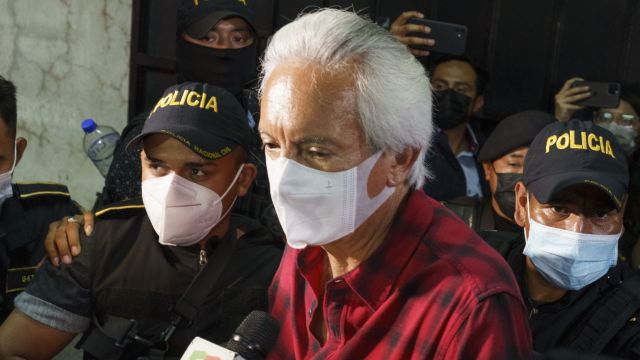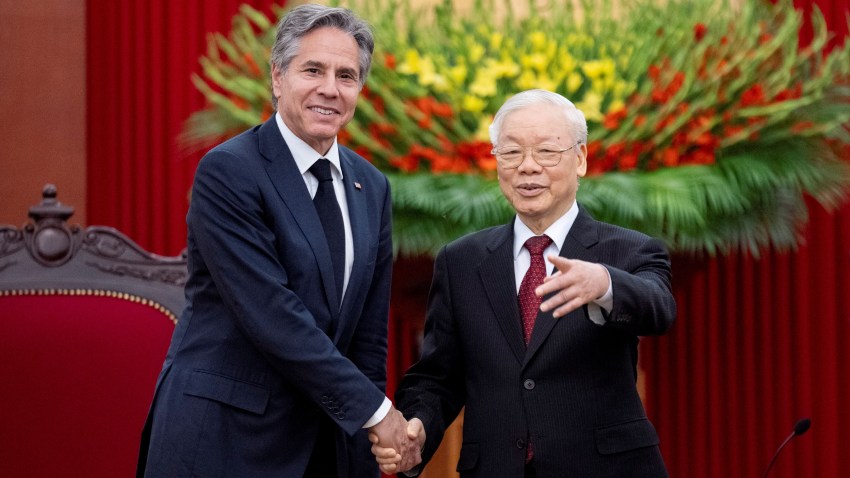Today at WPR, we’re covering Vietnam’s foreign policy strategy of ‘multi-alignment’ and why Europe can’t afford to be complacent when it comes to Berlusconi’s populist heirs.
Get the Daily Review sent straight to your inbox every weekday.
First, though, here’s our take on today’s top story:
Russia’s nuclear threats: Belarus’ leader Alexander Lukashenko said his country has started taking delivery of Russian tactical nuclear weapons, some of which he said are three times more powerful than the atomic bombs the U.S. used in Japan in 1945. It’s the first time since the fall of the Soviet Union that Moscow has moved such warheads outside Russia, Reuters reports.
Our Take: Since invading Ukraine last year, Russia and President Vladimir Putin have used veiled and not-so-veiled nuclear threats to try to intimidate and deter the West in its support for Ukraine. This move, however, represents the first concrete change in Russia’s nuclear posture.
Still, while the cost of nuclear escalation is so high that the West cannot completely ignore the risk, the actual probability of it happening remains low enough that Putin’s threats should not, and likely will not, significantly alter the West’s posture on the war in Ukraine.
More Context from WPR:
- Bruno Tertrais on why the West should take Putin’s nuclear threats over Ukraine seriously, not literally.
- Pavel Slunkin on Belarus’ de facto involvement in the war in Ukraine.
*****
You can read the rest of today’s News Wire, a curated selection of one must-read article from every region, here.

In response to the war in Ukraine and amid growing tensions with China, Vietnam has doubled down on its proactive strategy of multi-alignment, by simultaneously courting closer relations not only with the U.S. and China, but also with likeminded regional powers and neighbors.
As Richard Javad Heydarian writes, the strategy appears to be working.
Vietnam Is Doubling Down on Its ‘Multi-Alignment’ Strategy
Vietnam’s foreign policy strategy of multi-alignment—balancing relations with the US, China and regional powers—is paying off. Read more.
There are two clashing narratives about the legacy of Silvio Berlusconi. In Italy, many view him as a figure whose influence began to wane a decade ago. In other parts of Europe, where populist politics have emerged more recently, Berlusconi embodies trends that are still taking shape.
As columnist Alexander Clarkson writes, these two narratives each have a grain of truth:
Europe Can’t Afford Complacency on Berlusconi’s Populist Heirs
Not all of Silvio Berlusconi’s populist heirs will be as incompetent as Boris Johnson. Read more.

Global refugee crisis: The U.N. refugee agency’s annual report for 2022, which was released today, put the number of people forcibly displaced in the world at 110 million. Of them, 35 million are now refugees, fueling a global refugee crisis to which the countries of the Global North have responded by tightening border controls and limiting access to asylum, in part through third-county resettlement schemes that Matthew Gibney examined in his WPR in-depth article last week.
This week’s question: Should the Global North continue to restrict access to asylum, or should it instead make migration easier?
Just reply to this email to give us your take, along with your name and where you’re based. We’ll include the best ones we receive in the Daily Review over the course of the week. Those selected will also receive a free month of WPR.

In Guatemala, a verdict is expected today in the trial of José Rubén Zamora, a high-profile journalist whose newspaper regularly investigated corruption in the government. Zamora stands trial on charges of financial wrongdoings, but the case has highlighted the severe democratic backsliding in the country under President Alejandro Giammattei, with its culmination coming just ahead of a general election on June 25.
For more context, Frida Ghitis reported on Zamora’s arrest last August, while Dinorah Azpuru wrote in December about the country’s authoritarian slide and the dilemma it has created for the U.S.

Jose Ruben Zamora’s Arrest Puts Guatemala’s Democracy Deeper in Peril
April 18, 2023 | In July, Guatemalan police arrested Jose Ruben Zamora, one of the country’s most prominent journalists and publisher of El Periodico. Read more.
Guatemala’s Authoritarian Slide Under Giammattei Is Putting Biden in a Bind
Dec. 12, 2022 | Recent elections in Brazil and the U.S. may have reinforced the impression that democracy is alive and well in the Americas. Read more.

That’s all for today’s Daily Review. Coming up, we’ve got stories on Indonesia’s peace plan for the war in Ukraine and a breakdown of Montenegro’s recent elections.
Have a great day,
Jakob Cansler
More from WPR
- Richard Gowan on the endless quest to reform the U.N. Security Council.
- James G. Dyke on why geoengineering alone isn’t a climate change solution.
- James Bosworth on reports that Cuba will host a Chinese spy station.
- Bereket Diriba on the ongoing conflict in the Oromia region of Ethiopia.
Jakob Cansler is WPR’s assistant editor and the author of the Cansler Culture newsletter.

